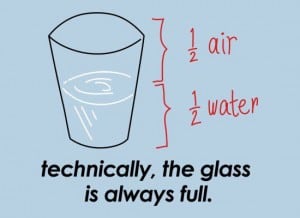
The Water Glass Analogy
Is it half-full or half empty?
 |
| photo credit: akosuaannobil.com |
The questions seems simple enough, but perspective is based on experience and expectation. The observer always brings a bias:
Do you like water?
Are you thirsty?
Does this question even matter to you?
Then there are those who examine the tangential qualities, avoiding the question to linger in the details surrounding the situation:
Is the glass dirty?
How long has it been sitting out?
Is that glass smaller than normal?
These folks sit in the circumstance, and let their latitude determine their position. The setback here is a long trail of excuses, repetitive and rut-forming, never letting the onlooker feel informed enough to make a decision and react. The user remains stagnant and unchanged.
Finally, there is the lot that completely turn inward on the suggestion, asking themselves if they are half full or half empty:
Have they suffered a loss?
How recent was their setback?
Do they have any control over their current situation?
It’s never just about water in a glass.
Your perspective is rooted in your beliefs.
If you’re unhappy with your outlook, you first have to figure out where it came from in the first place. Perspective isn’t about the what; it’s about the why and because. There’s a reason we see things the way we do. We practiced a particular form of thinking and observation. Change comes from practicing differently. What has been done can be undone. The fluidity of perspective calls for it.
The truth is whatever you believe it to be.
 |
| photo credit: blogs.themailbox.com |
What is it you wish to change?
What is it you wish to keep?
Is the true grunt of the work adjusting how you look at it?



